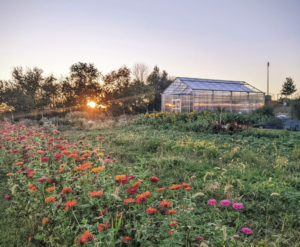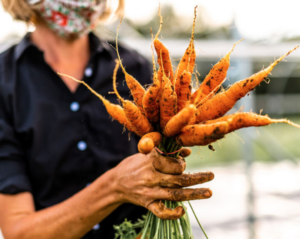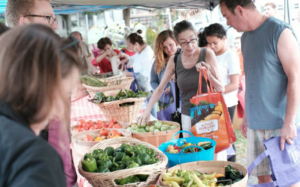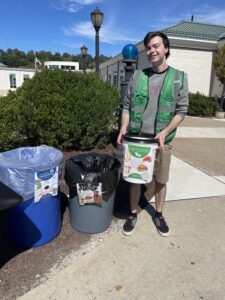Connect with us
Office of Sustainability
746 High Street
Easton PA, 18042
sustainability@lafayette.edu
From our campus farm to the plates of students and our community, then back into the soil, Lafayette is working to create a sustainable food loop system.
 At the beginning of the cycle, produce is grown on campus at our 3-acre campus farm and used in campus dining halls or distributed to the local community. 18,000 pounds of fruits, vegetables, herbs and flowers are cultivated annually using regenerative and organic practices such as no-till and cover cropping. About 25% of students visit LaFarm each year either through their classes, to volunteer, or just to spend time in nature away from the buzz of campus. Students and faculty utilize LaFarm as a living laboratory, studying growing practices and implementing new tools and technology to aid in production.
At the beginning of the cycle, produce is grown on campus at our 3-acre campus farm and used in campus dining halls or distributed to the local community. 18,000 pounds of fruits, vegetables, herbs and flowers are cultivated annually using regenerative and organic practices such as no-till and cover cropping. About 25% of students visit LaFarm each year either through their classes, to volunteer, or just to spend time in nature away from the buzz of campus. Students and faculty utilize LaFarm as a living laboratory, studying growing practices and implementing new tools and technology to aid in production.
During the spring and fall semesters produce from LaFarm is used in meals prepared at dining halls. In addition to LaFarm, Lafayette’s Dining Services works to source ingredients locally and with sustainability standards, such as Fair Trade. Dining Services curates unique menus and portioning to decrease waste at eateries across campus.

Each week in the summer and fall, LaFarm has a farmstand where students, faculty and staff can purchase fresh salsa, sauce and produce grown and harvested by students. Preorders are available online.
This program was created to decrease food waste and food insecurity on campus. Students are alerted by GroupMe about food available after events, decreasing event related waste and providing accessible food on campus. Learn more and join Leopard Leftovers.

During the summer, about 6,000 pounds of produce grown at LaFarm is distributed to the local community to help address food insecurity in Easton, providing fresh, local produce. LaFarm partners with the Kellyn Foundation, the Easton Hunger Coalition and the Project of Easton to distribute harvested fruits and vegetables.
In another effort to decrease food waste and increase food access, students run a Food Recovery Network on campus. Students collect prepared leftover foods from dining halls and bring them to local food pantries. Learn more about FRN on OurCampus.

If food is not captured by other means, food scraps are collected from various sources, such as dining halls, catering, and large-scale events and composted at a vessel on campus. Finished compost is transported to LaFarm to be used as nutrients for the soil, completing the food loop.
Creating a Sustainable Food Loop at Lafayette.